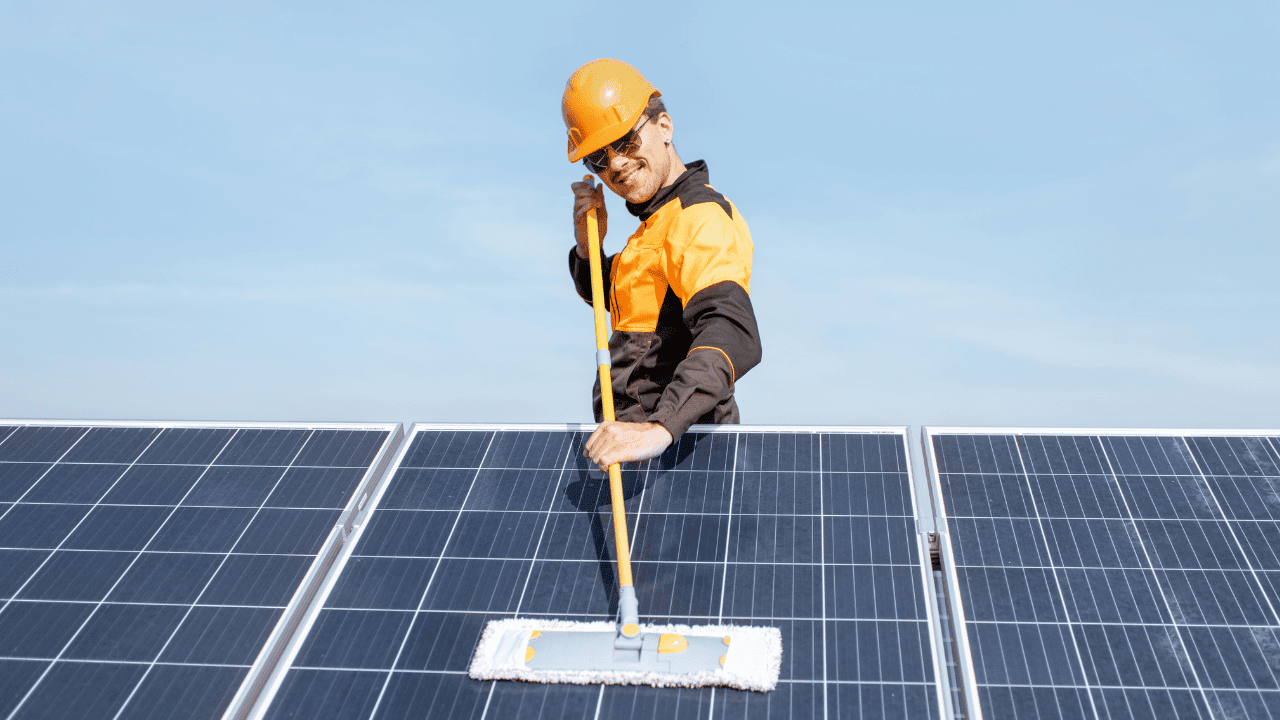As a team of solar energy enthusiasts, we know the importance of keeping our solar panels clean for peak performance.
Rain has always been seen as a natural cleaner for various surfaces, including solar panels. It can help remove light dust and debris, maintaining efficiency to some extent.
However, in regions with heavy dust, bird droppings, or algae growth, rain alone may not be enough. To ensure optimal performance, periodic professional cleaning is recommended.
Let's explore if rain truly cleans solar panels effectively.
TLDR
- Rain plays a significant role in keeping solar panels clean and maintaining their efficiency.
- Self-cleaning technology can aid in removing dust and debris from solar panels.
- The quality of rainwater and the frequency of rainfall can impact the cleaning effectiveness.
- Professional cleaning methods are recommended for optimal efficiency and longevity, as rain alone may not be enough to thoroughly clean the panels.
Factors Impacting Solar Panel Efficiency
When it comes to solar panel efficiency, regular maintenance is crucial. Factors such as dust accumulation, bird droppings, and the growth of algae or moss can significantly impact the performance of solar panels.
While rain can help remove light debris, it may not be enough to thoroughly clean the panels. Therefore, it's important to consider professional cleaning methods to ensure optimal efficiency and longevity.
Importance of Solar Panel Maintenance
Maintaining the efficiency of solar panels is crucial for maximizing their performance and longevity. Environmental elements such as dust, bird droppings, and the growth of algae or moss can negatively impact the panels' efficiency.
While rain can help remove light dust and debris, it may not be enough to thoroughly clean the panels, especially in areas with heavy accumulation. Therefore, periodic professional cleaning is recommended to ensure optimal efficiency and productivity.

Effects of Environmental Elements on Solar Panels
To ensure optimal efficiency and longevity of solar panels, it's crucial for us to be mindful of the effects of environmental elements and the importance of regular maintenance.
Factors such as dust accumulation, bird droppings, algae formation, moss growth, and sunlight exposure can all impact the efficiency of solar panels.
Additionally, temperature fluctuations, humidity levels, wind impact, rainwater quality, and air pollution can also affect their performance.
Regular maintenance, including professional cleaning, is recommended to keep solar panels in top condition.
Role of Rain in Cleaning Solar Panels
Rain plays a significant role in keeping solar panels clean and maintaining their efficiency. The quality of rainwater, frequency of rainfall, and the collection of rainwater can impact the cleaning effectiveness. Additionally, self cleaning technology can aid in removing dust and debris.
Factors such as dust particle size, rainwater pH levels, acidity, and mineral content also affect the cleaning process. Proper cleaning is essential for maximizing solar panel lifespan and ensuring optimal performance.
Cleaning Methods for Solar Panels
When it comes to cleaning solar panels, it's important to know the recommended techniques and the risks associated with improper cleaning.
Using the right methods ensures that panels are thoroughly cleaned without causing any damage or scratches.
Recommended Cleaning Techniques
For optimal performance and longevity, we recommend periodically cleaning solar panels using professional techniques. Here are some key tips for efficient and safe cleaning:
- Use eco-friendly cleaning agents to minimize environmental impact.
- Schedule professional cleaning at least once or twice a year to ensure thorough maintenance.
- Invest in specialized tools like soft brushes and squeegees for effective cleaning.
- Safely remove bird droppings using gentle cleaning methods to prevent damage.
- Prevent algae and moss growth by keeping panels clean and clear of debris.
Regular maintenance and cleaning will maximize energy production and extend the lifespan of your solar panels.
Risks Associated with Improper Cleaning
To ensure optimal performance and longevity of our solar panels, it is crucial to be aware of the risks associated with improper cleaning methods and the factors that can impact their efficiency. Potential damage, such as scratching surfaces, can occur if abrasive materials or tools are used. Water infiltration may lead to corrosion risks and electrical hazards. Improper cleaning can also result in decreased efficiency, streaking issues, residue buildup, and voiding of warranties. Therefore, it is advisable to consider the benefits of professional cleaning.
| Risks | Impacts |
|---|---|
| Potential damage | Scratching surfaces |
| Water infiltration | Corrosion risks, electrical hazards |
| Decreased efficiency | Streaking issues, residue buildup |
| Voiding warranties | Loss of warranty coverage |
| Professional cleaning | Thorough cleaning, improved efficiency |
Frequently Asked Questions
How Often Should Solar Panels Be Professionally Cleaned for Optimal Performance?
For optimal performance, we recommend having solar panels professionally cleaned periodically. Factors like dust accumulation, bird droppings, and algae affect efficiency. Regular maintenance is important for longevity. Rain alone may not be enough.
Is It Necessary to Clean Solar Panels in Areas With Light Dust Accumulation?
In areas with light dust accumulation, rain can help clean solar panels to a certain extent. However, for optimal efficiency and longevity, it is still necessary to periodically clean the panels professionally to remove stubborn debris and maintain peak performance.
What Are Some Common Signs That Solar Panels Need to Be Cleaned?
When solar panels need cleaning, signs may include panel discoloration, reduced energy production, increased dirt buildup, visible debris, loss of efficiency, streaks or spots, poor performance on cloudy days, insect infestation, pollen or leaf accumulation, and increased reliance on grid power.
Can Rainwater Alone Remove Bird Droppings or Algae From Solar Panels?
Yes, rainwater can help remove light dust and debris from solar panels, but it may not be enough for bird droppings or algae. For optimal efficiency, periodic professional cleaning is recommended along with rainwater maintenance.
Are There Any DIY Cleaning Methods That Can Be Used to Maintain Solar Panel Efficiency?
Yes, there are several DIY cleaning methods to maintain solar panel efficiency. Some options include using a vinegar solution with a soft brush, a window squeegee, high pressure washer, baking soda paste, or a microfiber cloth.







